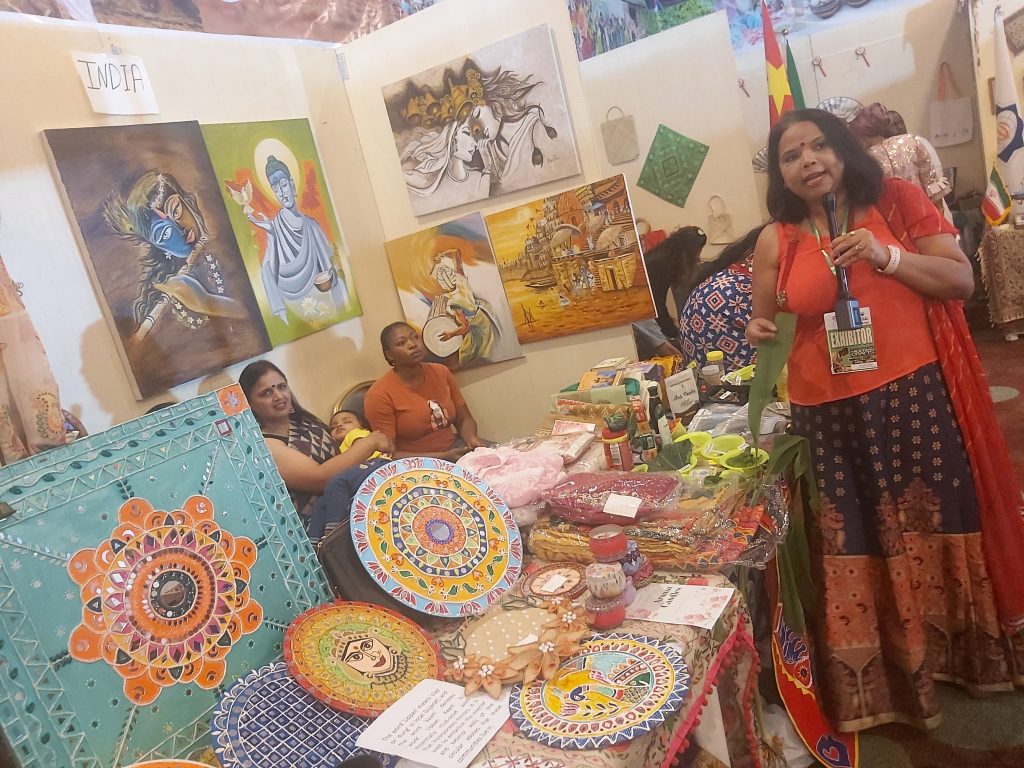Nigerians struggling with consumption and use of locally made products has been a great challenge for the country.
Nigerians seem not to understand that patronising locally made products will boost the nation’s Internally Generated Revenue (IGR) and its Gross Domestic Product (GDP).
This simple act has transformed the economy of great nations of the world like China, Japan, United States of America, France and Germany, just to mention a few.
The National Council for Arts and Culture (NCAC) has taken the campaign for the need to patronise local products to the next level, which is evident at the just concluded 35th International Arts and Crafts Expo (INAC), in Abuja.
NCAC took advantage of the expo which attracted delegates from over 26 countries and 15 states to sensitise Nigerians on the advantages of embracing local products.
This was done through consumption of local drinks and cuisines by both local and international delegates.
Kunu, Tigernut, Zobo drinks, Ofada rice, and other major delicacies were served to the delegates.
With the theme of the expo, “Networking Nigerian Crafts to the World”, NCAC went ahead to exhibit local crafts, arts, fabrics, and also indigenous engine oil manufacturers.
The expo held from Aug. 18 to Aug. 20 at Sheraton Hotel in Abuja.
In a bid to promote reading culture among the Nigerian youth, NCAC also encouraged exhibitors to display books of African authors.
Nigerian musical bands and artistes were not also left out. The delegates were thrilled with indigenous music peculiar to Nigeria and Africa.
Alhaji Ado Yahuza, Executive Secretary, National Institute for Cultural Orientation (NICO), urged Nigerians take conscious efforts in patronising local products.
He said Nigeria is well endowed with various nutritious cuisines which can be developed and exported to boost the nation’s foreign exchange earnings.
“Nigeria is so blessed with different kinds of delicacies, let us all work on embracing our products, project them for international acceptance and then make money from it,” he said.
Chief Olusegun Runsewe, NCAC’s Director-General, said the focus on consuming and exhibiting local produce was a deliberate move like the previous years to further drive home the need to patronise the nation’s products.
Runsewe said that INAC is organised annually with the aim of showcasing the rich and unique collections of African arts and crafts and as an avenue to promote rural economy.
He said Nigerians must be aware that expos are good avenue for product launch.
He noted that he deliberately wanted to make culture Nigeria’s new oil by taking conscious efforts in projecting the country’s diverse crafts and arts.

Runsewe urged Nigerians to invest in branding local produce for export, adding that good packaging will attract the needed audience.
“The expo is meant to promote importation and exportation of arts and crafts to international communities.
“We also aim at sensitising investors on the need to invest in the arts and crafts sector as a way of encouraging enterprise development and export oriented production.
“We are also looking at establishing an international arts and craft market in the African region, we want to attract international investment in line with government’s development agenda,” he said.
Runsewe said that the creative industry should be seen as Nigeria’s new oil, capable of creating huge employment opportunities, tackling the nation’s security problem and engaging the youth meaningfully.
“We can address the problem of insecurity and youth restiveness in this sector, if we can get things right by believing in our products and our skills, taking them to the next step,” he said.
Runsewe also took opportunity of the platform to woo investors and tourists to Nigeria, adding that Nigeria is a safe country with lots of opportunities.
The expo which also featured a skills acquisition programme empowered no fewer than 137 youths in skills like bead making, body ornaments, gele making, and makeup.
12-year-old Munachi Okoronkwo of Federal Government Girls College, Bwari, who was mandated from school to learn a skill during the summer holiday was elated with the skill she acquired.
Also, Mrs Patience Ameh, who learnt bead making and body ornaments said the three-day skills acquisition programme was quite effective as she could independently produce neck pieces and beaded slippers.
According to Ameh, she sold some of the slippers she made and looks forward to generating revenue from it and converting it to her business.